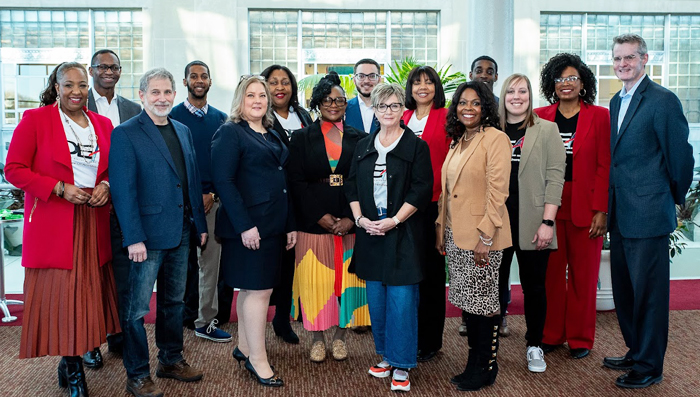
The Truth Staff
The Diversity Equity Access Inclusive Alliance of Northwest Ohio held its first annual meeting last week. The two-day event encompassed a variety of sessions including the CEO Summit and Professional Panel on Wednesday March 15 in the McMaster Room at the Toledo Lucas County Public Library Main Branch; the DEAI Career Fair and the NW Ohio Supplier Diversity Expo on Thursday, March 16 at the Glass City Center.
The DEAI ALLiance was formed in May 2022 after Toledo’s Diversity Employment Career Fair and is comprised of a number of individuals from assorted businesses, agencies and educational organizations, most of whom are focused on the work of diversity, equity and inclusion principles within those organizations.
Last week’s conference presented an astonishing array of guest speakers, panelists and presenters designed to address a variety of topics related to DEI issues such as entrepreneurship, diversity programs, career advice, business best practices and the reasons that large corporations should strive to incorporate those principles.
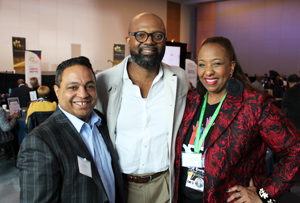
The CEO Summit
Wednesday’s CEO Summit – sold out well in advance – featured moderator Marquis Miller, vice president, Diversity, Equity and Inclusion with the Obama Foundation and a panel of local leaders: Brian Chambers, CEO of Owens Corning; Vince DiPofi, CEO of SSOE and Dionne Dorsey Somerville, PhD, president of Owens Community College. The panel members addressed their individual attempts to bring diversity, equity and inclusion into their workplaces.
“These are not conversations that we have always been comfortable at having,” said Miller setting the tone at the outset. “But there are the kinds of conversations that are absolutely essential and necessary … we should all be proud of the willingness and ability to have these conversations and do the hard work of transformation from the inside out.”
“There is a cultural imperative here to make the company different,” said DiPofi describing the challenge at SSOE. He added that the traditional culture had not been ”sustainable in the long run.”
Chambers introduced the fact that such a change in a company’s culture to be more inclusive starts at the top. “It’s a personal commitment to create more opportunity.”
Chambers noted that within Owens Corning, there had been a celebration of diversity in the workplace for quite some time. However, “we did not have an inclusive environment,” he said. An incident within the company in 2014 led the company’s leaders to start talking about bringing real change.
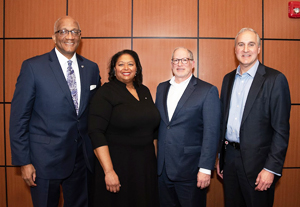
DiPofi echoed the sentiment that change all starts within a company “with a personal commitment.”
“It has to start at the top,” said DiPofi. “This is important to us and important to the people I work with.”
Diversity, equity and inclusion, both leaders agreed, means that a diverse workforce must be brought in, and that a company must begin the process of becoming diverse and inclusive all the way to the top.
“If we cannot attract the best diverse talent in the world,” said Chambers, “we cannot remain competitive.”
When Dorsey-Somerville took over the top post at Owens Community College, she observed that a lot of DEI effort “goes into symbolism and infrastructure.” She came into that position, however, when there were a lot of questions about the future plans but now “it’s part of our strategic plan … because our product is our people.”
Dorsey-Somerville arrived on campus realizing that “our student demographics reflected Toledo but our employees weren’t reflecting that – we weren’t doing for our employees what we were doing for our students.”
The questions for the college were “how do we become an employer of choice? And “are we doing everything we need to do to become inclusive?”
“How do you do it?” asked Miller of the panel. That is, how does a company or organization go about finding the process of becoming diverse and inclusive?
“Be prepared for frustration and set backs – be resolved that it is a journey,” said Chambers. He added, however, that it is a very systematic process that is time consuming and requires behavioral training up and down the line – from the board members to every level of employees.
“You can’t just say ‘let’s do it and not back it up with money – you have to make the investment,” said DiPofi.
It’s also a community process all three panelists agreed. That is, such an effort to transform a company’s culture must involve the community at large. “Allies are so important,” said Dorsey Somerville.
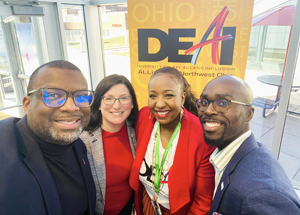
The NW Ohio Supplier Diversity Expo
The program for Thursday’s Supplier Diversity Expo at the newly remodeled Glass City Center, hosted by the Ohio Minority Supplier Development Council (OMSDC) and the University of Toledo Office of Diversity, Equity and Inclusion, promised a jam-packed schedule of “Special Presentations, a Fireside Chat and Breakout Sessions on a variety of topics.”
In fact, Thursday’s event was all that and more – a day with a wealth of information and multiple opportunities for business owners to connect with suppliers and advisors, gain insights and learn to grow their enterprises.
Adding to the spectacular lineup of events and networking opportunities was the venue itself – the Glass City Center with its recently renovated space and breathtaking view of the ball park and its surroundings.
The Expo was organized by Lenora McIntyre, interim program manager for Equity Community Relations and Supplier Diversity at UT and her staff.
The Supplier Diversity Expo attendees were greeted by Greg Braylock, Jr., ProMedica VP of Talent and Organizational Chief Diversity, Equity and Inclusion Officer; by Toledo Mayor Wade Kapszukiewicz and by Dila Das, PhD, UT VP for Diversity, Equity and Inclusion.
“We’ve been able to find our way to economic success … but we can do even better by having everyone at the table,” said Kapszukiewicz during his remarks. The mayor spoke of a diversity study the city had commissioned that produced “a mixed bag of results” and laid out “12 recommendations that we are going to act on.”
“We want to work with the City of Toledo to grow minority-owned businesses,” said Das. “We are determined to reach out to hundreds of thousands to help more move into the middles class. Degree attainment translates into business success and life success.”
The Fireside Chat portion of the program featured Wendy Gramza, president and CEO of the Toledo Regional Chamber of Commerce, moderating a panel consisting of David Zenk, executive director of the Metroparks of the Toledo Area; Gael Heskia, Owens Corning VP Global Sourcing & Supply Chain and Stephanie Smith, Fifth Third Bank Senior VP & Chief Diversity Officer.
The discussion revolved around the issue of “how companies and organizations work together to achieve diversity success,” started Gramza at the start. “Why? Because it’s something we have to do – it’s the right thing to do for our society to survive.”
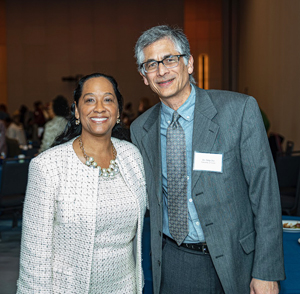
While that Fireside Chat session dealt with the concepts of working together, Derick Gant, financial expert with PGN Consulting, led a discussion on opportunities for minority businesses in the Lucas County and Ohio areas. Joining Gant were panelists Jennifer Van Horn, Chief Planning and Capital Projects Officer for Metroparks; Jason Toth, Sr. AVP for Administration at UT; Lacy Deberry, III, director of Diversity and Inclusion with the City of Toledo; Mary Kunckel, deputy director for Support Services with the Lucas County Commissioners and Valarie M. Williams, Minority Procurement Manager with the Ohio Department of Development.
This group focused on the issue of the opportunities that are within minority businesses grasps in the immediate future.
Marquis Miller returned to the stage during lunchtime on Thursday for a presentation on reimagining supplier diversity. Miller, during his address, focused on the need for companies and organizations to have the frank conversations about what no longer works in their attempts to maintain supplier diversity.
“Supplier diversity has not kept up with the economy,” he said while adding that “a model that doesn’t work anymore becomes out of fashion.”
He urged companies to start training and looking at things “in a $360 degree way … it’s time for us to lean into this new way of thinking.”
He suggested dedicating resources, supporting local contractors and equity consulting as several ways to start that re-thinking process. He also called for greater transparency in reviewing actions that have perhaps been unsuccessful in creating greater diversity.
“If you don’t know how you have dome in seeking a contract, it will be harder to be [successful in the future].”
The key, said Miller, for small minority companies in obtaining contracts, is for larger businesses and organizations to streamline the process so that the MBE’s can “get work, do work and be paid.”
After lunch, numerous breakout sessions were held.
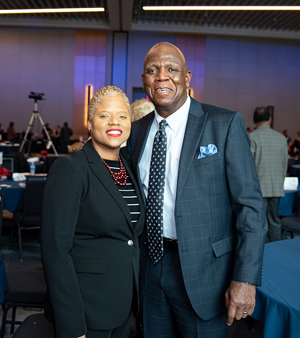
The Ohio Minority Supplier Development Council held sessions on rebranding, the origins of OMSDC University engagement for corporate supplier diversity professionals.
Simultaneously, supplier diversity breakouts were moderated by Erik Johnson, president of Ivy Development Agency; Calvin Brown, co-founder and COO PGN Consulting and Jeff Schaaf, director of Talent Strategy with the Toledo Regional Chamber of Commerce.
Access to Capital was the subject of Schaaf’s session and included panelists Craig Teamer, director Finance and Special Projects, Toledo-Lucas County Port Authority; Sarah Allen, Sr Program Officer with LISC; Monica Womack, of the Ohio Department of Development; Jill Badger, VP Small Business Services, Toledo Chamber and Luther Thomas, VP and Metro Toledo Reg. Director Fifth Third Bank.
This group dealt with the Port Authority’s D-cap program along with other city and state resources for capital for minority-owned business.
Courageous Conversation Regarding Supplier Diversity Programs was the focus in Brown’s session and included Carla Cobb, VP Director of Supplier Diversity for Fifth Third; Jennifer Van Horn of Metroparks; Valoree Ohl, manage, Inclusion and Contract Compliance for the City of Toledo; Vincent Wiggins, Lead Sourcing Manager – Supplier Inclusion with La Z Boy and Kelli Snow, Supplier Management and Supplier Diversity Leader with Owens Corning.
This group dealt with issues concerning start up, enhancing and best practices in he realm of such supplier diversity sources.
Johnson’s group discussed the issue of vendors in the marketplace- who they are, where they are and, as Johnson said, “how to get out of a resource what you want to get out of it.”
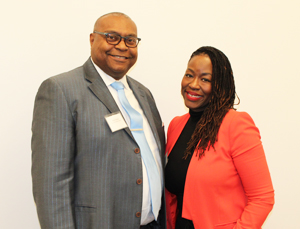
Joining Johnson were panelists: Ambrea Mikolajczyk, owner of ARK Restoration & Construction; John Tooson, principal/CEO of PGN Consulting; Ebony Carter, interim director, Minority Business Assistance Center and Kenny Farrar, SR associate, JumpStart.
This year’s first ever Supplier Diversity Expo was organized by a planning team that included representatives of JumpStart, the City of Toledo, Peak Electric, Owens Corning, the Toledo Chamber and the Lucas-County Port Authority, along with the staffs of UT and the OMSDC.
The DEAI members are Felica Clerk of Metroparks; Houston C. Young of Owens Corning; Rhonda Sewell of Toledo Museum of Art; Bob Savage of Toledo Tomorrow; Erin Baker of the Toledo Lucas County Public Library; Joy Goodner of Global People and Culture Leader; Shannon K. Loar of Huntington Bank; Crystal Darnell of the LC Board of Commissioners; Matt Scheiber, education and workforce professional; Lesean Shaw of Bitwise Industries; Melvin Jackson of Toledo Tomorrow, Pam Moehler of Toledo Tomorrow; Tiff Thompson of ProMedica; Austin McDonald of Owens Corning, Vincent Wiggins od La Z Boy and Lenora McIntyre of UT.
